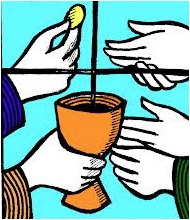Extraordinary Ministers of Holy Communion

The Role and Importance of EMHCs
In today’s Church, the role of Extraordinary Ministers of Holy Communion is vital in pastoral ministry. They are described as “helpers and collaborators of the clergy in serving the community” (Q&A on Extraordinary Ministers of Holy Communion, p.5). EMHCs function as a service team, rather than a religious association (Q&A, p.9).
The ministry of EMHCs is a service of Christ’s Body for Christ’s Body, reflecting Christ’s care and the interconnectedness of His members. Through their ministry, they nourish the faithful and unite the community in Christ (Q&A, p.5). Although the sick and homebound cannot physically attend Mass, the Church does not forget them but brings Christ’s love to them, just as the apostles once “broke bread in their homes and praised God” (Acts 2:46-47).
More Than Just Distributing Communion
EMHCs do more than bring Holy Communion (Body and Blood of Christ) to those unable to attend Mass. They also share the Word of God by reading Sunday Scriptures and summarizing the homily in a way that is easy to understand. Additionally, they pray with the recipients and keep them connected with the parish community. They communicate important parish and Church updates and inform the parish of the recipient’s needs, such as requesting the Sacrament of Reconciliation, Anointing of the Sick, or hospital visits. In this way, EMHCs serve as a bridge between the parish community and those receiving Communion.
Ongoing Formation and Spiritual Growth
To fulfill their role effectively, EMHCs must engage in ongoing formation and maintain a rich spiritual life. A deep love for the Eucharist, frequent participation in the Holy Mass, receiving Holy Communion, and regular Scripture reading are essential. Through their service, they are called to become more like Christ, touching the hearts of those they minister to and building a community of love (Q&A, p.51).
